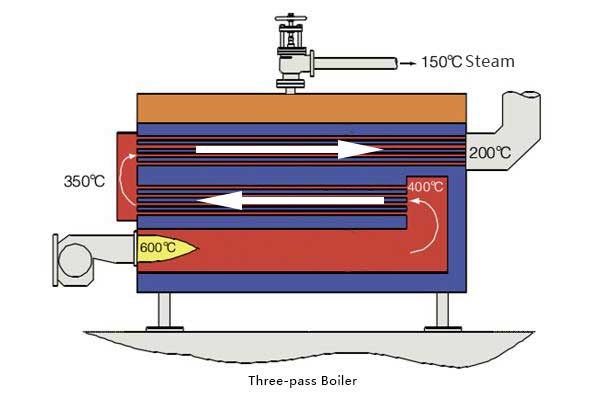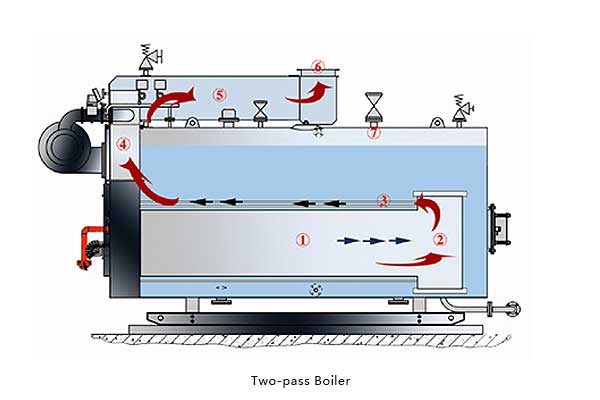What Is Boiler “Pass”
A “pass” in boiler terminology denotes one full traverse of flue gases through the tube bundle submerged in water, transferring heat before being redirected or exiting the system. A three‐pass boiler guides exhaust gases through three successive tube arrays—first through the furnace, then two smoke‐tube sections—before reaching the chimney. By contrast, a two‐pass boiler channels gases through only two such zones, cutting structural complexity but offering fewer heat‐exchange opportunities.
Vertical fire‐tube boilers often feature a single pass, commonly called Horizontal‐Return Tubular (HRT) designs in compact applications. In these, flue gases pass straight through one tube run and exit, simplifying maintenance but limiting efficiency.

Technical Difficulty Comparison
Designing a three‐pass boiler demands precise fabrication of two reversal chambers and three distinct tube bundles, increasing welding operations and potential leak points. This extra heat‐exchange area boosts efficiency but requires tighter manufacturing tolerances and more extensive refractory lining management. Two‐pass boilers eliminate one smoke‐tube bank, simplifying tube‐bundle layout and reducing the number of reversal chambers—but they may need auxiliary economizers or condensers to approach the efficiency of three‐pass units.
Moreover, installing economizers on two‐pass systems incurs additional piping and structural support, whereas three‐pass boilers integrate economizer surfaces more compactly, trading off ease of access for footprint efficiency.
Safety & Stability
Multi‐pass boilers typically contain larger water volumes due to their extended shell and tube bundles. In three‐pass designs, this extra water acts as a thermal buffer, dampening pressure and temperature fluctuations during load swings—enhancing stability in industrial processes. However, keeping reversal chambers submerged is critical: low water levels risk tube‐dryout and tube‐bundle fractures, potentially leading to catastrophic failure.
Two‐pass boilers, with smaller water inventories, can respond faster to steam‐demand changes but may exhibit wider pressure spikes and require more sensitive level‐control instrumentation to maintain safe operating margins.
Maintenance Cost Comparison
Three‐pass boilers involve additional tubes and reversal chambers, which must be periodically cleaned, inspected, and replaced if corroded—raising annual maintenance labor and parts expenses. Conversely, two‐pass boilers, though simpler, often employ condensers or economizers that also require regular servicing, blunting their maintenance‐cost advantage.
Overall, more passes mean more surface area exposed to corrosive flue gases and more welds to monitor for fatigue—factors that compound over the boiler’s service life and must be budgeted in total cost of ownership analyses.
Is There a Single‐Pass Boiler?
Traditional single‐pass (HRT) boilers exist mainly in vertical or small‐capacity applications, trading efficiency for simplicity. However, FangKuai Boiler’s innovative single‐pass steam boiler overcomes conventional limitations by employing patented wing‐tube technology that multiplies heat‐exchange area fivefold within a single traverse. This design dramatically reduces total flue‐tube length, achieves efficiency on par with multi‐pass units, and minimizes the boiler’s footprint—translating into lower civil‐work and installation costs without sacrificing performance.
Conclusion
Choosing between two‐pass and three‐pass boilers hinges on balancing efficiency gains against increased technical complexity, safety considerations, and long‐term maintenance costs. While three‐pass designs excel in maximizing thermal transfer and stability, they demand higher upfront investment and servicing budgets. Two‐pass boilers offer a middle ground but may require auxiliary heat‐recovery equipment. For applications prioritizing compactness and cost‐efficiency, FangKuai Boiler’s single‐pass solution delivers high performance in a streamlined package—challenging the conventional wisdom that more passes always equate to better boilers.
Get your best price
Quickly compare 3 FREE quotes
- Engineer quick quote
- The overall delivery speed is fast
- Financial choice
- Low installation costs and cost savings
25 years+ of boiler R&D
More than 20 innovative technologies


